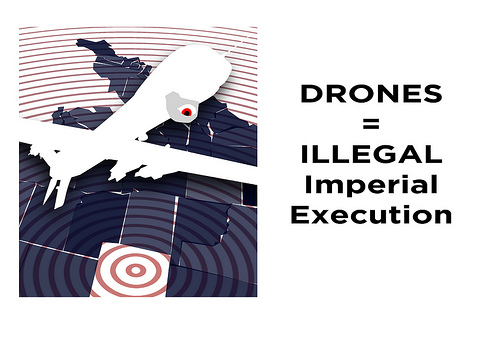In the echoing words of the late Susan Sontag: “Let’s by all means grieve together, but let’s not be stupid together.” She wrote that to Americans after 9/11. It applies maybe quadruple after the Boston bombings — and to us as well.
U.S. policy-makers knew a huge spike in their drone killings in the Muslim world would have consequences. Why? Because actions have consequences. Just as they should’ve known that invading and shredding two nations, Afghanistan and Iraq, would have consequences. The surviving Tsarnaev brother “told interrogators that the American wars in Iraq and Afghanistan motivated him and his brother.” (Washington Post) The deceased brother told a friend: “America is a colonial power trying to colonize the Middle East and Africa.” (60 Minutes). The conclusion they drew — bombing the Boston Marathon — is heinous. But it comes from somewhere and has antecedents, such as the civilian bombings of the Second World War on all sides. It also has its logic: you kill our innocents and we’ll kill yours. It’s barbaric, not irrational.
The U.S. went to drones partly to avoid the consequences of occupation. But that replaced one set of causes with another. People know where those killing machines that literally terrorize them by droning overhead for days before striking, come from. I can also see a certain shabby political sense in it. For Barack Obama it might have seemed necessary to prevent a Mitt Romney victory. They had to forestall another domestic terror strike, at least till the election, and look tough in the process, as Democrats always must.
Why don’t they just pull back from their global overreach, eliminating those consequences? That’s hard to imagine. It would probably be easier to do than to imagine, which I know sounds strange. But U.S. policy for over a century has been built on its right to intervene and dominate anywhere. When Iran acts on its own borders or China does in the South China Sea, the U.S. considers that “meddling” in areas where it has every right to be.
Diminishing its global dominance would also lead to dismantling its military machine, which would require a huge retooling of its economy. But that ongoing presence has effects. As someone recently said, the British learned to accept the reality of bombings during “the troubles” with a sang-froid that Americans might need to acquire.
What I don’t get is why we’re caught up in the same consequences, as we learned again this week. There isn’t even a twisted logic in that. We aren’t a global power and we don’t need to rip off others’ resources. We sell resources to them. We have a history of aligning with the imperial biggies (in both world wars) but we’ve also learned how to straddle that line ambiguously. At times — in Vietnam or Iraq — we actually managed to antagonize our U.S. overlords. This gave us limited credibility on all sides, which the Harper government has deliberately squandered. Its policies have made us more imperial and aggressive than the centres of empire. That’s made us targets for terror just as they are.
I don’t see why they pulled this shift. Perhaps they’re being true to their ideals, which would make us the first country in history not to base its foreign policy on self-interest. Or it’s their way of wrenching Canadians out of the liberal/Liberal mentality they abhor. If we get treated like Americans, maybe we’ll start thinking we are them. On either reading we lack any self-interest in policies for which U.S. leaders are clearly willing to pay a price. We simply pay the price, with no benefits. That makes us double stupid, in Sontag’s sense.
Causes are weird. Root or not, they’re easier to see in others than oneself. The National Post’s Andrew Coyne, defending Justin Trudeau’s query about root causes in Boston, asked why “extreme ideologies . . . take root in some people but not others.” But you could ask the same about the extreme free market ideologies that have taken root in Coyne and his colleagues at the Post. Were they “self-radicalized” — or seduced by devious outsiders? Who knows — but people tend to draw conclusions based on the circumstances they see around them. You want to change the conclusions, try changing the circumstances.
This article was first published in the Toronto Star.
Photo: Truthout.org/earthsharing australia/Flickr



